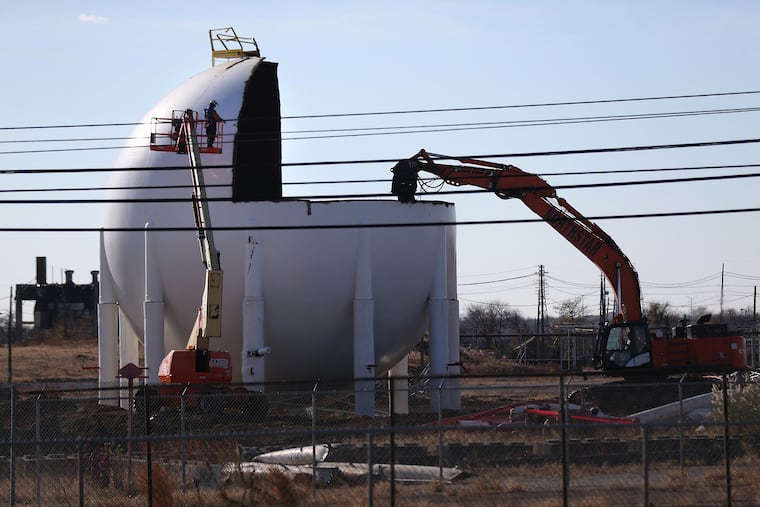The South Philly refinery site plan should support, not displace, residents | Opinion
As we negotiate with Hilco and City Council members who will shepherd the site's future, I hope to see everyone win.

In 2016, I stood with a group of Point Breeze neighbors to oppose our neighborhood school being turned into condos. The School District had sold off Smith School to a developer who planned to turn the buildings into market-rate housing. Neighbors wanted the land to be kept for public use. We lost that battle, and I once again tasted the bitterness of development that does not care for the needs of residents, an experience shared across Philadelphia as gentrification has taken its toll.
The fight for Smith School is a memorable example of residents coming together across race, class, and generation to stand for the heart and soul of the place we all live. I see a continuation of that unity around the redevelopment of the former Philadelphia Energy Solutions oil refinery site. Seventeen (and counting) community organizations based in Grays Ferry, Point Breeze, Packer Park, West Passyunk, Girard Estates, Eastwick, Elmwood, and Kingsessing have formed the United South/Southwest — Coalition for Healthy Communities. Our mission is to develop and achieve a community benefits agreement with Hilco Redevelopment Partners, the company repurposing the former PES oil refinery site into a logistics hub.
» READ MORE: Plans reveal Hilco’s intent to reshape Philadelphia refinery landscape
A community benefits agreement (CBA) is a legally binding agreement between developers and coalitions of community organizations that addresses a wide range of needs as negotiated by the community, like hiring quotas for surrounding neighborhoods, financial investment in community centers, and environmental protections. Ultimately, a CBA holds developers accountable to their promises and ensures local residents share in the benefits of the development. Hilco and city officials have expressed interest in supporting the community and a CBA. We’re organizing to ensure the CBA is robust and driven by residents’ needs.
The CBA our coalition is developing for the Hilco site is historic and vital to the health of our neighborhoods. Over the next decade, 1,300 acres of land in Southwest Philly will undergo major transformation with the elimination of the largest polluter in the city, the creation of thousands of union jobs, and added green space. As Hilco carries through on its promises to improve our city, property values will rise and new residents will likely be attracted to South and Southwest neighborhoods.
The CBA can and must be a tool for instituting clear strategies for counterdisplacement and affordable housing so that long-term residents — especially low-income residents of color who have generational roots in these neighborhoods, and bore the health costs of the former refinery — can enjoy the fresh air, health, and quality of life denied for so long by the refinery’s operations.
» READ MORE: For the anniversary of Philly refinery explosion, a call to end environmental racism | Opinion
As our coalition offers leadership to build a CBA that protects residents from displacement, we look forward to working with City Council and other experts to establish smart development strategies that will ensure housing justice. We have numerous examples to draw from, like studies highlighting the best ways to preserve affordable housing, zoning overlays that preserve the feel of neighborhoods and prevent overbuilding, the creation of land trusts that keep property affordable, and the use of the Land Bank to oversee the fair and strategic distribution of city-owned land.
My neighbors in Point Breeze and I know exactly what will happen if the largest redevelopment in Philadelphia’s history happens without robust counterdisplacement strategies. We’ve seen this story play out over the last decade, each time a new three-story home towers over the other houses and is too expensive for anyone on the block to afford, each time the corner deli with a $5 sandwich is replaced with a new business selling one for $12, and each time a long-term homeowner is forced to relocate because of rising property taxes. My neighbors and friends who were born and raised in South Philly know the impact of incentivized market-driven development is personal, traumatic, and overwhelming.
As we negotiate the Hilco CBA, united with extensive knowledge of our communities, I hope to see a scenario where everyone wins. Everyone wins when community voices are respected and listened to. Everyone wins when our elected officials partner and support neighborhood-driven priorities. Everyone wins when decisions are made with empathy and humanity, not only the bottom line.
Haley Dervinis is an at-large board member serving the Point Breeze Community Development Coalition and a representative to the United South and Southwest — Coalition for Healthy Communities (a coalition that includes Concerned Citizens of Point Breeze, Eastwick Community Network, Eastwick Friends & Neighbors Coalition, Empowered Community Development Corp., Friends of Historic FDR Park, Friends of Penrose, Friends of Queen Memorial Library, Friends of Stinger Square Park, Girard Estate Neighbors Association, Packer Park Civic Association, Philly Thrive, The Pinwheel Group, Point Breeze Community Development Coalition, Point Breeze Civic Association, Tasker Street Missionary Baptist Church — Community Outreach Corp., West Passyunk Neighbors Association, and 40th Ward Republicans).